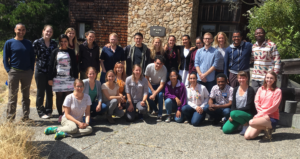Blog post by Rebecca Brown
This year’s VectorBiTE meeting was held at the Asilomar conference centre by the stunning bays of Monterey, California. In the days ahead of the working group sessions, post-doc and graduate students attended a three-day training workshop on quantitative tools for vector-borne diseases. Led by the charismatic Leah Johnson (Virginia Tech) and Samraat Pawar (Imperial College London), the workshop took the format of lectures followed by guided examples of analysis to gain practical experience, with assistance from instructors Fadoua El Moustaid (Virginia Tech), Marta Shocket (Stanford University) and Matt Watts (Imperial College London).
The training started off with data wrangling and an introduction to the R packages dyplr and tidyr, showing off their aesthetically pleasing summaries! The importance of minimizing editing your raw data file was highlighted (something I am guilty of) thus a key outcome was to record all steps used to process your data with an R script. We learned that models are not only useful to explain relationships in observed data, but models are key for revealing underlying mechanisms driving observed patterns. In the context of vector-borne diseases this is critical for predicting disease outbreaks or assessing the efficacy or suitability of interventions. Model fitting by least squares methods was taught and we worked through an example of fitting a non-linear least squared model to insect trait data. This was followed by teaching on the likelihood based methods: Maximum likelihood estimation and Bayesian analysis, which was new territory for me. We were taken through the steps to fit a model using maximum likelihood by creating a function to return the negative log likelihood to build the likelihood profile based on the data.

On the final day, our new-learned skills were put to the test with a challenge! Our group tackled understanding mosquito development rate variation with temperature by maximum likelihood estimation. All groups came together at the end to share how they addressed their problem. The previous two days of intensive training paid off because there was a notable improvement in my understanding and ease of using the new techniques. I’m looking forward to applying these tools in my own analysis now. Thank-you VectorBiTE!
———-
Rebecca Brown is a PhD student at the Institute of Biodiversity, Animal Health and Comparative Medicine in Glasgow. She is interested in the impact of land-use change on the transmission of vector-borne diseases. Her current research is on the behaviour and ecology of Anopheles vectors of Plasmodium knowlesi malaria in Malaysian Borneo.

